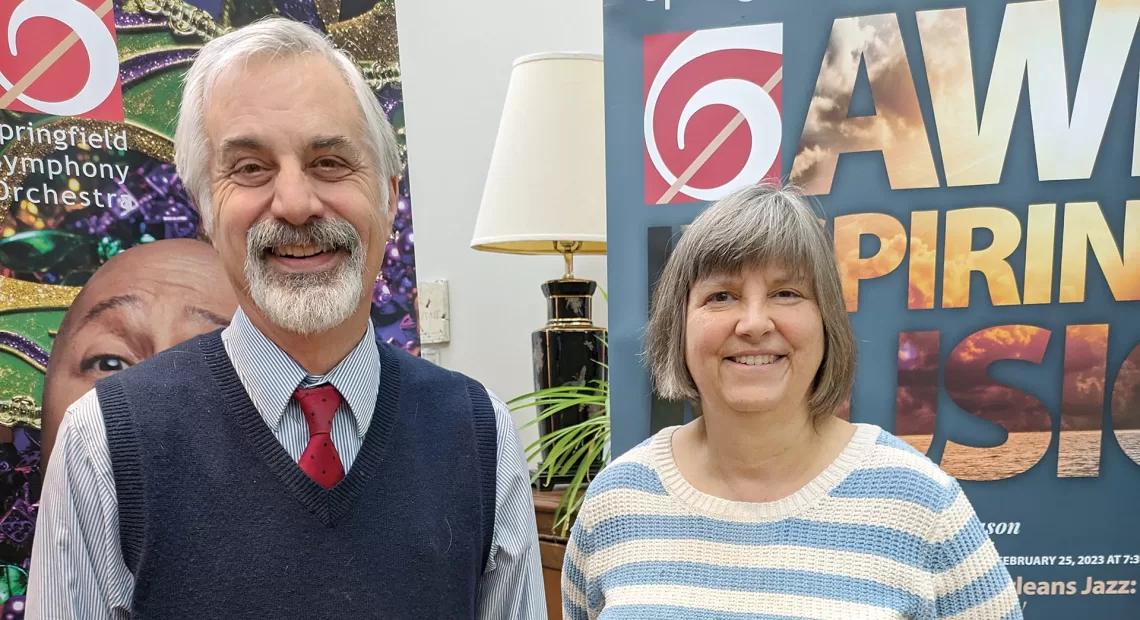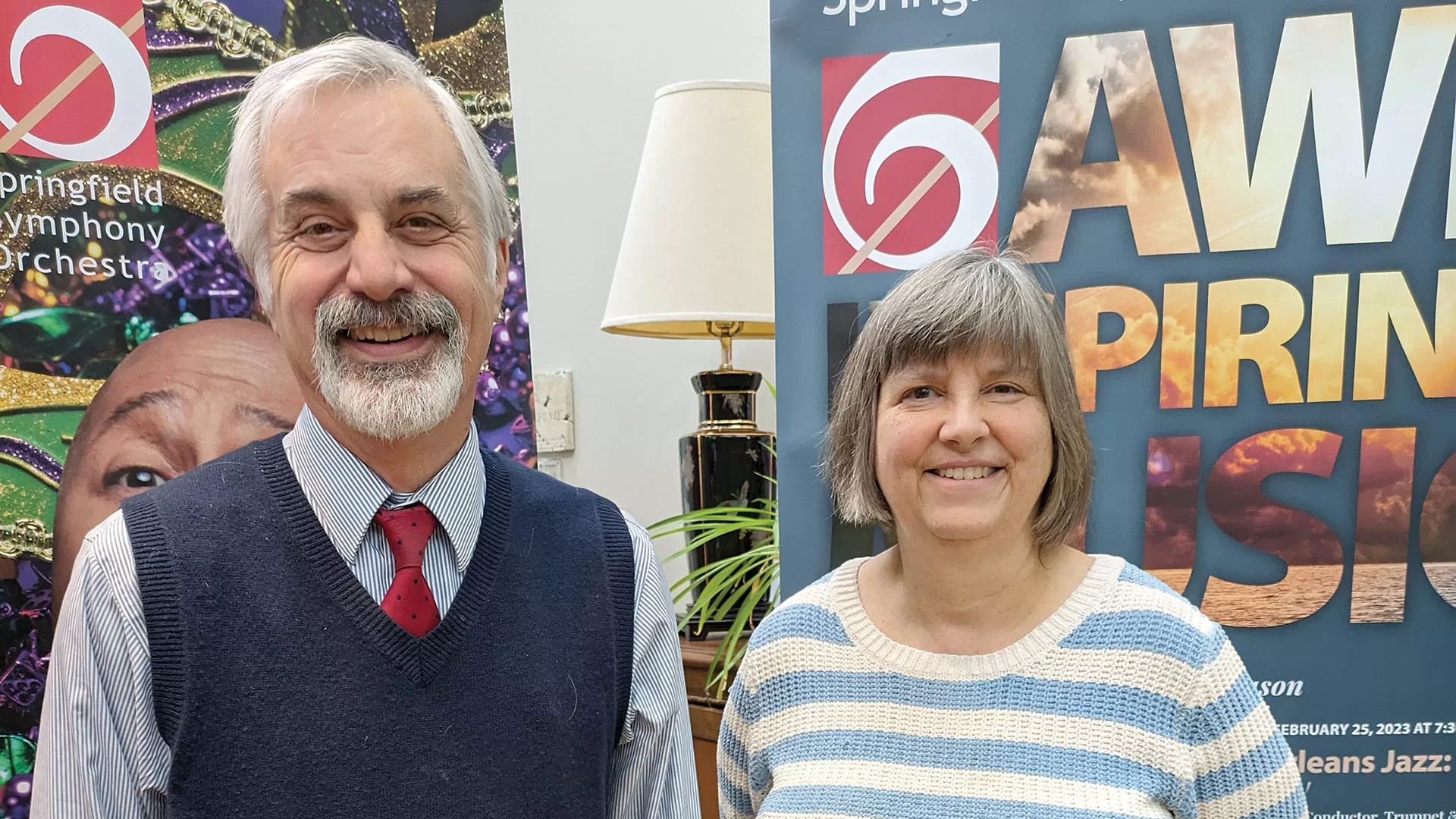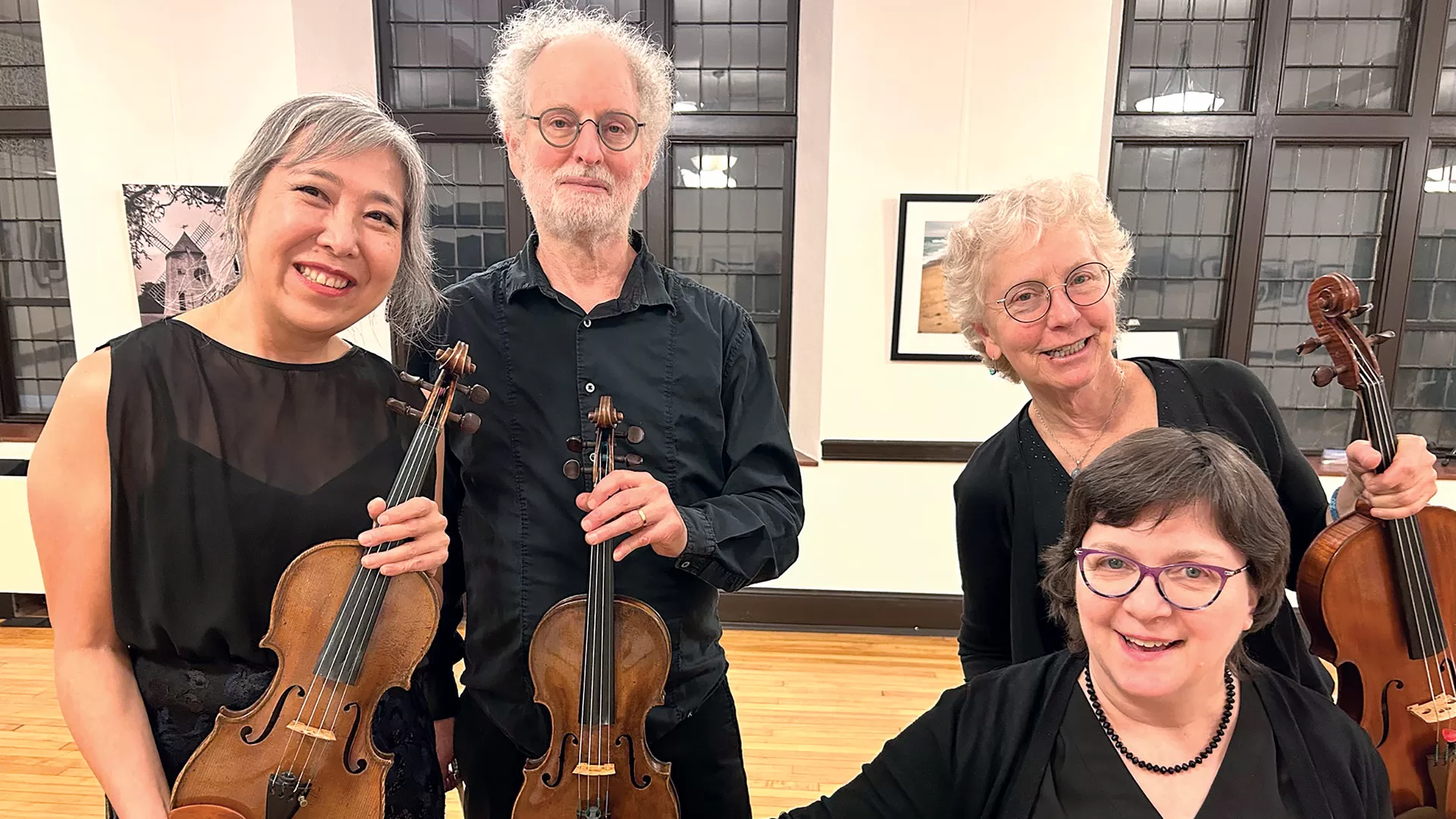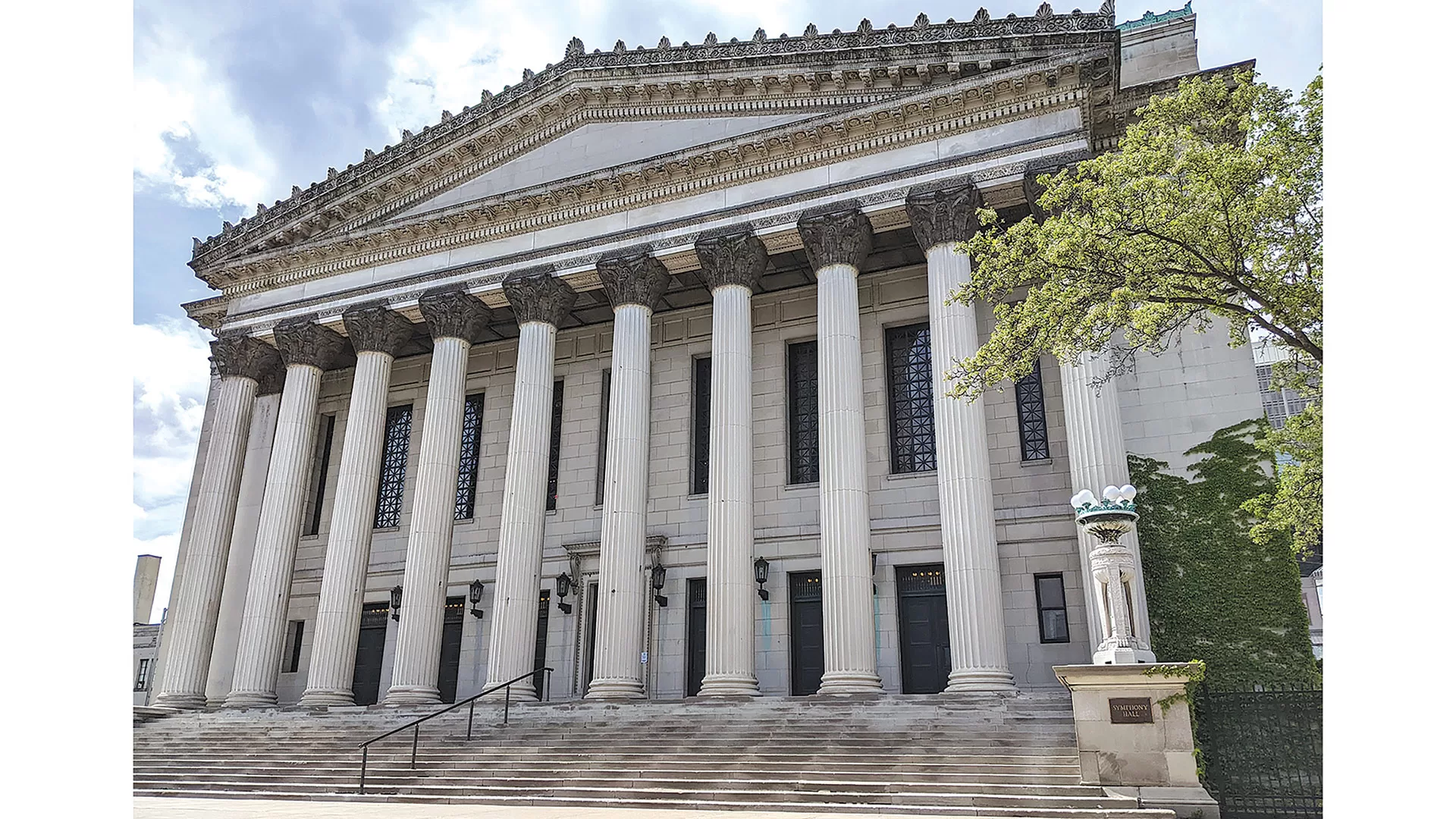
Springfield Symphony Orchestra and Springfield Chamber Players
They’re Keeping Music Alive in New Ways for Future Generations

Springfield Symphony Orchestra President and CEO Paul Lambert and Springfield Chamber Players Chair Beth Welty.
Beth Welty said the musicians just wanted to play.
With the Springfield Symphony Orchestra’s leadership and musicians locked in a labor dispute in 2021 and 2022, the players were willing to perform under the old contract until a new one was settled, but the SSO wouldn’t agree.
“At this point, the pandemic had subsided enough that all the other orchestras in the Northeast had come back to work, audiences were showing up, and we decided we needed to do something,” Welty said. “We were very worried if there was no symphonic music in Springfield — out of sight, out of mind — people would forget about us. We had to keep this going.”
So the musicians started staging shows on their own — both at Symphony Hall and at smaller venues around the region — churches, the Westfield Atheneum, anywhere they could draw an audience.
“We were playing at all these little places, constantly expanding to new communities and venues, and bringing live chamber music to as many people as we possibly could in Western Mass.,” said Welty, an SSO violinist who headed up the effort known as MOSSO, or Musicians of the Springfield Symphony Orchestra.
“So many people, including members of my board, have told me, ‘the first time I ever heard a symphony orchestra was in school.”
Well, you might know the story after that — the SSO and the musicians’ union struck a two-year deal last spring to bring full symphony concerts back to downtown Springfield, which proved gratifying to SSO President and CEO Paul Lambert, who never considered the musicians his enemies as they worked out their labor differences.
“I grew up in the Actors’ Equity Association. I’m a union member. And I believe in organized labor, especially in the performing arts. You want to make sure that everyone is well taken care of,” he said. “At the same time, I’ve been a businessman for a long time, so I’m very well aware of the economic realities and challenges that the performing-arts business is going through, especially in these eccentric times we’re still living through.”
The relief on both sides, in fact, was palpable. But the return of concerts to Symphony Hall was only part of the story. The other part was the continued existence of MOSSO under a new name — Springfield Chamber Players — and its continuing mission to bring smaller chamber concerts to venues around the region, including schools.
“We’re interested in promoting the voices that don’t get heard as much but are great composers — music by Black composers, composers of color, women composers,” Welty said. “We’re mixing in composers people have some familiarity with, but also bringing them composers they haven’t heard of, even living composers.”
So as the music reverberates around the region once again, BusinessWest has chosen to honor both the Springfield Symphony Orchestra and Springfield Chamber Players as Difference Makers for 2024 — not because they settled a labor agreement last year, but because of how important the performing arts are to the region, and how important both entities are to filling that role, hopefully for generations to come.

The Springfield Chamber Players string quartet includes Miho Matsuno, Robert Lawrence, Martha McAdams, and Patricia Edens.
(Photo by Gregory Jones)
“When people come to the concerts, and I may open with remarks, I ask people, ‘just for a couple of hours, turn off your cell phones and let it go,’” Lambert said. “It’s like therapy — go listen to some beautiful music. For a few hours, just relax and drink it in. We just need that so badly right now.”
Welty agreed. “Music is a big part of life, and I want that for everyone. It doesn’t have to be classical — we did a combo jazz-classical concert,” she noted, before citing Duke Ellington’s famous line about how genre doesn’t matter, and that “there are simply two kinds of music, good music and the other kind.”
And good music — good live music — truly makes a difference in a community.
Generation Next
Lambert recalled being in the fourth grade and attending a symphony concert; in fact, it’s an especially vivid, formative memory. So he’s grateful for a two-year, $280,000 grant from the city last spring to help the SSO create educational programming for youth.
“We are deeply involved in finding creative solutions, ways to reach out. This is a giant opportunity to reach all kinds of members of our community who might like to learn more about music — classical music, symphonic music, all the various forms of music that we can touch,” he said.
Meanwhile, through a program called Beethoven’s Buddies, people can donate money toward free tickets for those who might not be able to afford one. “Whatever your situation is, we want you to come to these concerts to hear this music and have a wonderful time,” he explained. “We’re excited about that. It’s also another way that we can reach into our community to pull in people as donors and sponsors.”
“You come together, and the concert happens, and it’s magic. It’s that one-time experience of being together in a space where this beautiful thing happens. It’s special.”
A long-time program called the Springfield Symphony Youth Orchestra is going strong as well, Lambert said, and the SSO just hired an education director, Caitlin Meyer, who has been engaging with public schools and colleges on everything from internships to educational programming and performances.
“That’s a critical piece in the equation,” Lambert added. “So many people, including members of my board, have told me, ‘the first time I ever heard a symphony orchestra was in school.’”
Meanwhile, Springfield Chamber Players recently presented educational outreach concerts at the Berkshire School in Sheffield and the Community Music School of Springfield.
Meeting young people where they are is simply a matter of survival for performing-arts organizations, said Mark Auerbach, Marketing and Public Relations director for Springfield Chamber Players.
“A lot of people who go to symphonies and come to our concerts are on the older side. And it’s partly because the music programs in schools are not what they were 30 or 40 years ago,” he noted. “If we can get family concerts going, educational concerts going, and interest kids and young adults to come to concerts, hopefully they will stay and grow with us.”
Welty is glad the SSO is doing grant-funded youth outreach because the budget for Springfield Chamber Players is limited, so it needs to be a group effort.
“I’ve been with the symphony 40 years, and we used to have a really robust school presence. We’d send a trio or a quartet to play for kids, talk to them, and answer questions. And they later came to Symphony Hall to hear the whole orchestra,” she recalled. “I think they want to bring that back. We have to be developing the next generation of audience members.”

Leaders of both Springfield Symphony Orchestra and Springfield Chamber Players are gratified to be bringing music back to both Symphony Hall (pictured) and smaller venues around the region.
Part of the growth and outreach is simply broadening the definition of what an SSO concert is, Lambert told BusinessWest.
“A lot of folks think of a certain type of music from Western Europe, from the 18th and 19th century. And I love that music. I love Mozart. I love Brahms. I love Beethoven. I love Schubert. I’m thrilled to hear that music, personally,” he said. “But I’ve become increasingly aware of the streams of music traditions that exist all around the world in different cultures and different backgrounds that might appeal to all kinds of folks. So we are trying to pull those various streams together in our programming opportunities.”
To that end, the SSO has begun assembling some hybrid concerts that offer a mixture of traditions, like the classical-jazz fusion explored at the Martin Luther King Jr. celebration concert in January, and a Havana Nights show earlier this month that featured Latin jazz and Afro-Cuban rythms.
“The MLK concert had a marvelously diverse audience. We are thrilled when we see new people coming in,” Lambert said. “At our Juneteenth concert that we did last year, we had so many people telling us, ‘I’ve never been to one of your concerts before; I’ve never even been to Symphony Hall before.’ It’s thrilling to us to get those folks coming in to hear this beautiful music.
“Our pops concerts do really well, and we’re going to see what we can explore with those, with different genres of music,” he added. “At the same time, we’re never going to lose track of that beautiful, traditional repertoire that people, including me, love so much. That’s the core of who we are.”
A Resource of Note
Welty noted that Springfield Chamber Players has brought an eclectic spirit to its offerings as well, such as “Johnny Appleseed,” a composition by local composer Clifton Noble Jr. based on Janet Yolen’s book of the same name. That concert will take place outdoors in Longmeadow — the legendary character’s hometown — on May 12.
Whatever the venue, she is passionate about exposing more people to good music — whatever that means to Duke Ellington or anyone else — and to get them into music at younger ages.
“I wish every kid could take lessons on an instrument for a few years. You really learn so much. Problem-solving, analyzing, listening, observing. Music is very mathematical, too. Music education would boost everybody,” she said.
“I really think of arts organizations — music, a ballet company, whatever it is — as a resource for everyone,” she added. “You can’t just go to work every day and then go home and watch TV. That’s a boring life. You want something more. And kids that see live music get interested. They want to try it themselves.”
A thriving performance culture is also an economic driver, Auerbach noted.
“It’s essential that Springfield Symphony Orchestra survives because it’s the only live, nonprofit performing-arts organization in Springfield,” he said. “Without the arts, we’d have trouble attracting new residents and new businesses. And there’s a lot of economic spinoff — you go out, first you pay to eat, you pay to park, you may go out to drink afterwards. The musicians, if they are local, spend money here. If they’re not local, they have to stay in hotels and eat here.”
Lambert agrees, even though the demographics for this art form are challenging right now — not just in Springfield, but everywhere.
“For a couple of years during the pandemic, folks stayed at home, and they got used to not coming out at night so much. You got used to staying home and being cozy in your armchair and watching Netflix. Coming back from that was always going to be a substantial challenge.”
But the rewards are great, he added.
“I used to think about how people make wine — you grow the grapes, and you tend the vineyards, and you design the bottle, and you do all of this work. And then you get to dinner and someone opens the cork and you drink it, and it’s gone. But it’s a beautiful thing for that moment.
“I often think about our experience the same way,” he went on. “All the work and the rehearsals and the planning and the tickets and this and that. But you come together, and the concert happens, and it’s magic. It’s that one-time experience of being together in a space where this beautiful thing happens. It’s special.”





